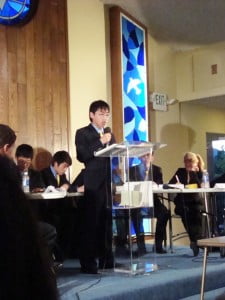
CVHS freshman Omar Trad gave a compelling argument that in part said that of the top 10 punishments that discouraged teens from drinking getting in trouble with police and/or the law.was number one.
Three skits and a
debate explore
solutions to underage drinking.
By Jason KUROSU
The Crescenta Valley Drug and Alcohol Prevention Coalition held a seminar regarding underage drinking which covered the topic in a variety of ways, including situations from both teenage and parental perspectives and various strategies for prevention. The CVDAPC often features guest speakers at their meetings, but a different approach was adopted for Monday night’s occasion, entitled Stop Underage Drinking: What Every Parent Needs to Know. This approach consisted of a three act play depicting different scenarios involving underage drinking and a moderated debate on how best to combat alcohol consumption amongst minors.
As attendees entered the Center for Spiritual Living, they were handed agendas for the night’s proceedings that were designed to look like playbills. The performers were teens and parents from the community, some of them members of the CVDAPC, and the scenes were scripted by high school students.

Act 1 depicted a pair of kids obtaining alcohol from their home, then joining a friend of theirs who had taken beers from his older brother. Act 2 depicted parents who felt underage drinking was safe as long as it occurred in their home while they supervised. Despite their presence, one of the teens left the home when they hadn’t noticed and drove drunk. The final act consisted of a series of statistics regarding alcohol usage rates among teenagers and touched upon how early alcohol use leads more frequently to persistent alcohol abuse later.
The meat of the seminar, however, was the debate. A team of students assembled by New Hope Academy Educational Director Hanna Oh and coached by New Hope’s Elizabeth Sutlian argued over two primary methods for preventing underage drinking.
The students, ranging from seventh graders to high school sophomores, were from Crescenta Valley High, La Cañada High, Valencia High, Flintridge Preparatory, La Cañada Middle School, Holy Redeemer Catholic School and Rancho Pico Middle School. They debated whether enforcing social hosting laws or developing parental involvement would be more effective in preventing underage drinking. The debaters were split into two five-member teams.

Team 1 argued the effectiveness of social hosting laws, which would hold parents and other liable for any dangers which would befall minors drinking in their presence. This deterrence strategy also included using Neighborhood Watch units that would locate any parties or other occasions where they thought underage drinking was occurring, provide mandatory awareness seminars to be held at local schools every few months and instill strict punishments for hosting underage drinking, such as fines and jail time. Team 1 also argued for alcohol outlet density regulation, which would reduce the number of available points of sale for alcohol in a given area.
Team 2 argued that parental involvement played a much bigger role in preventing underage drinking. They suggested the strength of the parental relationship would work best in communicating the dangers of alcohol abuse to kids. This would be strengthened by optional seminars and classes on drinking for parents, social media campaigns which would educate kids on drinking dangers and work on the parents’ part to keep any alcohol locked away at home where, Team 2 argued, kids obtain alcohol most easily.
The debate was moderated by Los Angeles Superior Court Judge Frederick R. Rotenberg, who had formerly participated in the “Every 15 minutes” program. The teams were allowed to make their cases and then a rebuttal period was given for the other team.

“According to a study in 2003,” said Team 1 member, CV freshman Omar Trad, “of the top 10 punishments that discouraged youth from drinking underage again, the number one punishment, with 68% effectiveness, was getting in trouble with police and/or the law.”
CV sophomore Paul Lee of Team 2 compared the situation to an oil spill, and spoke on how Team 2’s method of parental involvement was a more effective, preventative measure rather than enforcing social hosting laws, a reactionary one. Lee described Team 2’s stance as “fixing a leaky oil faucet rather than cleaning up the oil after the spill has already occurred.”
Team 2’s Victoria Huh of La Cañada Middle School said, “We believe our solution is a better approach because it is cost-effective, it strengthens family ties and it involves the whole community in solving the problem.”
Team 1 refuted Team 2’s arguments, saying that social media campaigns would prove ineffective, parental seminars would go ignored and that alcohol in the home, no matter if locked away, would eventually be obtained by children.
Team 2 argued that Team 1’s methods would lead to punishing parents unfairly who are unaware of their child’s drinking and that reducing the number of alcohol outlets makes the task of obtaining alcohol more difficult, but not impossible.
At the conclusion of the debate, neither team was necessarily considered “the winner,” as Judge Rotenberg commended all the participants for their hard work.

“Thankfully, I don’t recognize any of your professionally,” Rotenberg said to the audience, drawing laughs, “and I also know I won’t be seeing any of these kids in my court, unless they’re arguing a case.”
